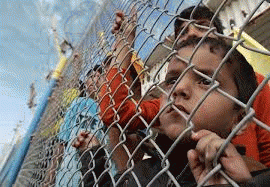They are all characters in one single, authentic, solid and cohesive narrative. The problem however, is that Western media and academia barely reflect that reality or intentionally distort it, disarticulate it and when necessary, defame its characters.
An authentic Palestinian narrative -- one that is positioned within an original Palestinian history and articulated through Palestinian thought -- is mostly absent from Western media and, to a lesser degree, academia. If such consideration is ever provided, everything Palestinian suddenly falls into being a side note of a larger Israeli discourse, or at best is juxtaposed to a pro-Israeli plot that is often concealed with hostility.
Palestinian news stories are often disconnected, disjoined news items with seemingly no relation to other news. They are all marred with negative connotation. In this narrative, a farmer, a prisoner and a refugee barely overlap. Due to this deliberate disconnect, Palestine becomes pieces, ideas, notions, perceptions, but nothing complete or never whole.
On the other hand, an Israeli narrative is almost always positioned within a cohesive plot, depending on the nature of the intellectual, political, academic or religious contexts. Even those who dare to criticize Israel within a mainstream Western platform do so ever prudently, gently and cautiously. The outcome of this typical exercise is that Israel's sanctified image remains largely intact. In the meantime, Palestinians constantly jockey for validation, representation and space in a well-shielded pro-Israeli narrative.
To counter these misrepresentations, the pieces must be connected to form a collective that would truly epitomize the Palestinian experience -- the story and the history behind it. Once that has been attained, there are chances for greater clarity regarding the roots of the conflict, its present manifestations and future prospects.
That can only happen if we return to the basics of a protracted tragedy that is draped with the names and stories of individuals. Doing so would ultimately articulate a consistent, generational discourse that deserves to stand on its own, without belittling juxtapositions or belligerent comparisons.
All tragic stories of the greater Palestinian narrative -- of those enduring the ongoing ethnic cleansing, those who are fighting for freedom and those who are seeking their right of return have the same beginning -- the Catastrophe, or Nakba.
But no end is yet to be written. The storyline is neither simple nor linear. The refugee is fighting for the same freedom sought by the prisoner or the son of an old farmer, part of whose family are refugees in one place or another. It is convoluted and multi-layered. It requires serious considerations of all of its aspects and characters.
Perhaps, no other place unites all of these ongoing tragedies like Gaza. Yet as powerful as the Gaza narrative is in its own right, it has been deliberately cut off from other urgently related narratives. This is the case whether it is in the rest of the occupied territories or the historical landscape starting with the Nakba.
To truly appreciate the situation in Gaza and its story, it must be placed within its proper context like all narratives concerning Palestine. It is essentially a Palestinian story of historical and political dimensions that surpass the current geographic and political boundaries that are demarcated by mainstream media and official narrators.
The common failure to truly understand Gaza within an appropriate context, whether it is the suffering, the siege, the repeated wars, the struggle, or the steadfastness and the resistance being presented, is largely based on who is telling the story, how it is told, what is included and what is omitted.
Most narratives concerning Palestinians in Western discourses are misleading or deliberately classified into simplified language that carries little resemble to reality. History however, cannot be classified by good versus bad, heroes versus villains, moderates versus extremists. No matter how wicked, bloody or despicable, history also tends to follow rational patterns and predictable courses.
By understanding the reasoning behind historical dialectics, one can achieve more than a simple understanding of what took place in the past. It also becomes possible to chart a fairly reasonable understanding of what lies ahead.
Perhaps one of the worst aspects of today's detached and alienating media is its reproduction of the past and mischaracterization of the present as it is based on simplified terminology. This gives the illusion of being informative but actually manages to contribute very little to our understanding of the world at large. Such over-simplifications are dangerous because they produce an erroneous understanding of the world, which in turn compels misguided actions.
For these reasons, we are compelled to discover alternative meanings and readings of history. To start, we could try offering historical perspectives that attempt to see the world from the viewpoint of the oppressed -- the refugees and the fellahin who have been denied the right to tell their own story among many other rights.
This view is not a sentimental one. Far from it. An elitist historical narrative is maybe the dominant one, but it is not always the privileged who influence the course of history. History is also shaped by collective movements, actions and popular struggles.
(Note: You can view every article as one long page if you sign up as an Advocate Member, or higher).





